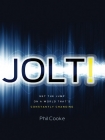Jolt!, Phil Cooke [reading women txt] 📗

- Author: Phil Cooke
Book online «Jolt!, Phil Cooke [reading women txt] 📗». Author Phil Cooke
The Bible’s impact on literature has been even more significant. Without an understanding of the Bible, it would be difficult, if not impossible, to probe the depths of writers from Milton to Shakespeare.
But it doesn’t stop there. The Bible has impacted novels from Moby Dick to Uncle Tom’s Cabin, the development of Negro spirituals and gospel music, and the speeches of Abraham Lincoln. The fact is, you would have little understanding of Dr. Martin Luther King Jr.’s “I have a dream” speech without an understanding of the Bible. Whatever faith tradition you come from—or if you come from no faith perspective at all—I would encourage you to explore the spiritual aspect of your life.
» WE ARE SPIRITUAL CREATURES, AND THROUGHOUT OUR LONG HISTORY, MANKIND HAS CONTINUALLY SEARCHED FOR ANSWERS TO THE QUESTIONS, WHY AM I HERE? WHAT IS MY PURPOSE? WHERE DID I COME FROM, AND WHERE AM I GOING?
Playwright Eugène Ionesco wrote in his memoir:
In the history of humanity there are no civilizations or cultures which fail to manifest, in one or a thousand ways, this need for an absolute that is called heaven, freedom, a miracle, a lost paradise to be regained, peace, the going beyond history . . . there is no religion in which everyday life is not considered a prison; there is no philosophy or ideology that does not think that we live in alienation . . . Humanity has always had a nostalgia for the freedom that is only beauty, that is only real life, plenitude, light.
Since the Enlightenment began in the eighteenth century, Western Civilization has pursued the religion of science and reason. We have elevated scientific pursuit to the highest ideal, and we value scientific inquiry above all other pursuits. It has resulted in marvelous scientific progress, and much of the luxury we experience today has been the result of this relentless pursuit.
But at the beginning of the twenty-first century, after three hundred years of unbridled scientific pursuit, we still haven’t answered the ultimate questions of our lives. Teen suicide continues in remarkable numbers, drugs and alcohol imprison millions, wars and genocide persist around the globe, families continue to fragment in ever-increasing numbers, cheating in school has reached record levels, happiness eludes us, and the quality of our lives is not significantly better.
For all of its wonderful advances, science has still been unable to answer eternal questions, such as:
Where did we come from?
Why are we here?
Do we have a purpose?
Where are we going?
In a development few would have predicted, some scientific advances are making us rethink the notion of a spiritual dimension to our lives. As more and more women are able to see their unborn children inside the womb through ultrasound technology, they are reconsidering the notion that a fetus is just a mass of cells.
On a trip to the United Kingdom, I noticed that London’s Sunday Times in 2004 reported that Antony Flew, emeritus professor of philosophy at Reading University, whose writings and teachings on atheism have influenced an entire generation of thinkers and scholars around the world, had recanted his position and believes that some sort of deity did create the universe.
Flew died recently, and although far from becoming associated specifically with Christianity, he believed that, according to the Times, scientific discoveries have revealed the existence of an organizing intelligence. He went on to say that investigation of DNA “has shown, by the almost unbelievable complexity of the arrangements which are needed to produce life, that intelligence must have been involved.”
An authentic spiritual journey is a journey of exploration, staying open to all detours, twists in the road, and new discoveries.
Do faith and reason conflict?
Absolutely not. The real man or woman of faith does not fear science, reason, or facts. And a scientist, confident in his or her abilities, has nothing to fear from spiritual inquiry.
The fact is, real faith can stand up to debate, inquiry, and investigation.
Writer C. S. Lewis came to his Christian faith only after years of investigation, study, and debate. He tried everything he could think of to discredit Christianity, and yet, in spite of his intellectual depth as a professor at Oxford, he could not find a single argument that disproved the reality of faith in God.
The key to living a vigorous life of faith is constant evaluation and investigation. Study, learn, discuss. Real faith is not a wishful hope in a vague concept. Real faith impacts the lives of everyone it touches.
Spiritual conviction was what drove the leaders of the civil rights movement to disregard police dogs, fire hoses, and jail for a cause they believed was true. Real faith is what fuels the persecuted church in countries where public expressions of religion result in imprisonment and death. Real faith is what takes suburbanites into the inner city to comfort those dying of AIDS, feed the hungry, or find homes for the homeless.
» SECULAR IDEALS INSPIRE MANY PEOPLE TO DO GREAT GOOD, BUT FAITH IN ETERNAL PRINCIPLES IS WHAT DRIVES REAL SACRIFICE.
Real faith is an adventure.
That’s why lasting change isn’t possible without some understanding of the spiritual aspect of our lives. If we are truly spiritual creatures—even in part—then overlooking that essential aspect of our lives leaves us fragmented and incomplete. Without some understanding of the spiritual dimension, we will never find real contentment and peace.
Perhaps that is the single most important consideration of all.
Today people spend their lives making money only to discover all the really important things money can’t buy. They trade their lives for a career, while losing the people they love the most. They live in physical luxury but then take their lives through suicide because of inner pain and torment.
Money is a good thing,





Comments (0)